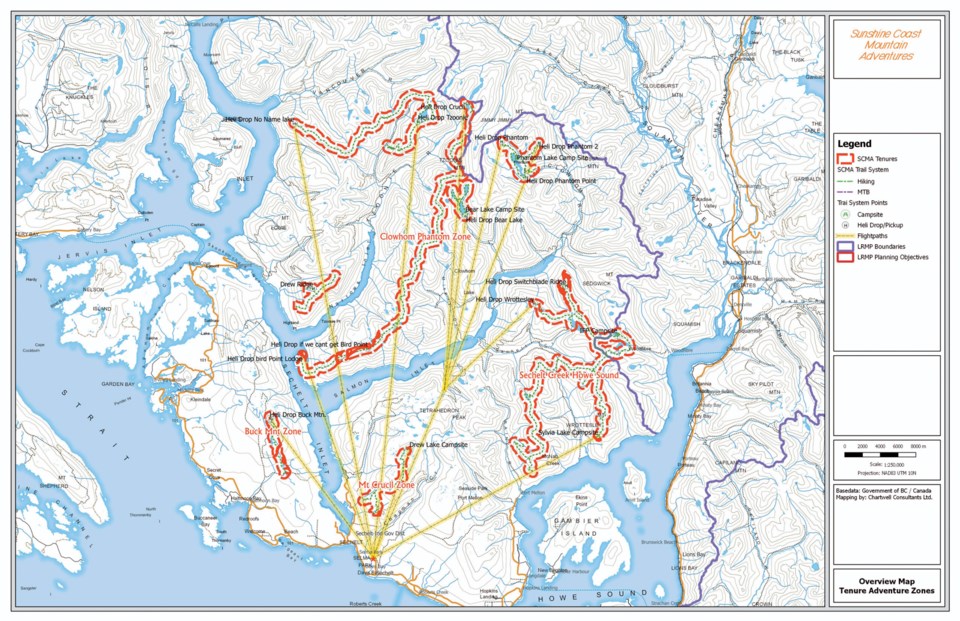Local mountain biker Kris Sneddon and his business partner Paul Tosczak, operations manager at Airspan Helicopters, want to bring helicopter adventure tourism to the Sunshine Coast.
Their company, Sun-shine Coast Mountain Adventures Limited (SCMA), would offer heli-hiking, heli mountain biking, heli-accessed “via ferrata” or protected climbing routes, and even heli-picnics in four “adventure zones” – Mt. Crucil, Buck Mountain, Sechelt Creek-Howe Sound, and Clowhom Phantom.
A land tenure application for commercial recreation and multiple use is under review by the province, which could give the operators permission to use Crown land, the total size of which is 19,250 ha.
“We believe there is an opportunity to fill a void in the tourism sectors of Sechelt, Gibsons and the Lower Mainland,” said the tenure application. “Promoting eco-tourism on the Sunshine Coast” is the goal, said Warren Hansen, a local forester providing technical advice on the application. “A lot of the areas we have identified in and around Sechelt Creek, you look above Sechelt Inlet. They’re mountain tops or lakes that people can’t get to,” he said.
Areas in the Phantom Lake and Woodfibre Lake areas would have overlapping tenure with Sea to Sky Air and Black Tusk Helicopter, which provide similar services based on the Squamish side. Sneddon said the tenure does not provide exclusive access and trails would be open to members of the public. “Other people are welcome to use the trails and infrastructures that we create,” said Sneddon. “No one’s being kicked out of an area for their normal recreation.”
None of the areas is within Tetrahedron Provincial Park, though Mt. Crucil’s peak is a kilometre south of the park’s southwest boundary.
Clients would access the tenure area via helicopter, motor vehicle shuttles, mountain bike and foot, with helicopter staging areas owned or leased by Airspan Helicopters or SCMA.
The operational base and head office would be located at Airspan Helicopters’ main hangar in Wilson Creek, with a storefront at Off The Edge Adventure Sports in Sechelt. Clients could also get helicopter rides from Coal Harbour in Vancouver.
According to an SCRD staff report, the construction of trails and tourism operation would span the summer of 2018 to 2021, with heli-hiking and sightseeing available as soon as next summer. Trail layout and construction for mountain biking would occur then, too. The project overview describes the trails as linking game trails, ridge tops and hard surfaces, which will be “low impact,” with some wooden bridges. The company will also construct four campsites during the construction phase.
An environmental management plan was included with the application.
The application must be approved by the Ministry of Forests, Lands, Natural Resource Operations and Rural Development, which requires feedback from the SCRD. The SCRD staff did not have any objections to the application, though CAO Janette Loveys did note that the referral is “a little outside the norm” of what the SCRD normally receives. “It is actually a whole program,” she said.
Several directors were skeptical of the project when it was introduced at a June 14 committee meeting.
Most outspoken was Mark Lebbell, director for Roberts Creek, who said he had “significant concerns with the project,” later adding, “I don’t really have the sense this is the right application for this part of the world at this point.”
Among his concerns was the development of infrastructure in the backcountry, especially without an integrated land use plan in place, harm to wildlife and the environment and a lack of emergency response planning. “This is an inherently impactful activity … and it brings up whether it should be a permitted activity back there,” he said. Elphinstone director Lorne Lewis, Halfmoon Bay director Garry Nohr and West Howe Sound director Ian Winn shared Lebbell’s concerns.
If the tenure application is successful, the applicant will develop an emergency management plan – a requirement for insurance.
Lebbell also questioned “whether there is a void that needs filling,” with regards to tourism, given that the services will be available “only to certain folks who are able to afford their access.”
According to the staff report, “the proposed adventure zones overlap various land use zones of the shíshálh Nation Strategic Land Use Plan, including conservation, cultural emphasis, stewardship and community forest areas.”
Keith Julius, director for shíshálh Nation, said the project sounds like a “great idea,” but was worried about wildlife if helicopter flight paths aren’t regulated. “I’m worried we’ll be chasing wildlife,” he told the committee.
Warren and Sneddon said consultations with shíshálh and Skwxwú7mesh Nations have been initiated and that the Nations “were involved a long time before the regional district was.” Warren also added that “a deeper meaningful” communication will take place.
SCRD chair Bruce Milne was more positive about the application. “We’re talking about a local family with a long and deep backcountry and forestry history… and I think we should keep in mind that they probably share the same values as the community at large and the board,” said Milne.
“Our business plan is taking a precautionary principle,” Hansen said. “It’s very planned growth, it’s taking a cautious approach to make sure we’re promoting it in a way that’s sustainable, that we learn from our mistakes, that we make sure we do it right.”
SCRD voted to ask the province for an extension to the comment deadline so that directors can invite the applicant to speak with directors, as well as host a public information meeting about the proposal.



